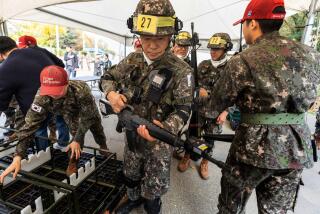Redefining What Makes a Good Soldier : Dutch Army Steps to a Different Drum
- Share via
BERNHARD ARMY BARRACKS, Netherlands — In the Dutch army a soldier doesn’t have to salute officers or sleep in the barracks. He can go home at night and call his union or even the Defense Ministry if he has a gripe.
An order is still an order and disobedience still can mean time in the stockade, but the military philosophy of the Netherlands is that it takes more than marching in cadence to a drill sergeant to make a good soldier.
The theory holds that military discipline comes from group cohesion and motivation, not from regimentation.
All of this is in evidence here at the Bernhard Army Barracks, where recruits learn to be tank commanders, drivers and gunners.
More Initiative
Proponents claim the 65,000-member army has more initiative, imagination and sense of responsibility than many other forces in the North Atlantic Treaty Organization.
But the idea has its critics, who contend the concept has reached its limits and any further liberalization could slacken discipline and hurt effectiveness.
Over the past two decades, the army abolished most public parades, the mandatory salute and dozens of other rules for behavior during peacetime on grounds that recruits viewed them as empty ritual.
But Capt. Joost van Bommel, who commands about 300 recruits taking the two-month tank training course at Bernhard Barracks, views it all with some caution.
“All those changes should not affect the essence of the armed forces,” said the 32-year-old officer.
‘The Big Word’
“It’s all got to do with the big word discipline . If that is undermined, our operational capability will be put at risk.”
The Netherlands, a nation of 14.6 million people, fills its military ranks through the draft.
Most of the armed forces’ 45,000 draftees serve 14 to 16 months in the army, with a lower ratio serving in the navy and air force.
Orders are explained to soldiers whenever possible, just like they would be in civilian jobs, said Sgt. Maj. Robert Polman Tuin, the camp’s most senior noncommissioned officer.
“There’s a lot less of the trappings of external discipline because we rely on the men’s own responsibility. That’s what brings about internal discipline.”
At the end of the work day, usually at 5 p.m., the recruits are free to leave for the night. About 15% stay overnight out of choice or because of night duty.
No Bugle Blowing
There’s no bugle blowing reveille in the morning.
“We just advise them” it’s time to get up, said Polman Tuin.
Garrison soldiers earn at least 904 guilders ($452) a month, get weekends and every fourth Friday off, in line with the 38-hour workweek that applies to all government jobs in the Netherlands.
If they feel they have been abused by drill sergeants, soldiers can call a toll-free number at the Defense Ministry, where social workers investigate the complaints.
The same rules apply even to the Dutch marines, the nation’s military elite, where only 15% of recruits are draftees, said Capt. Herman van der Til of the marines.
Using Different Theories
“For years . . . we thought that if the fellow marched well and said, ‘Yes, captain, no, captain,’ he was a good marine. But we’re now using all kinds of theories about motivation.”
The imposition of uniformity to breed group cohesion has not entirely disappeared for Dutch recruits, however.
Outside the office of squadron commander van Bommel, fresh recruits in fatigues were getting their first rifle drill.
“A lot milder than I thought,” Pvt. Marco van Dijk said of his first taste of army life. “It’s only the first couple of days that you feel miserable.”
Bernhard Barracks’ recruits have just two months to learn to operate, maintain and fight with the army’s West German-built Leopard tanks.
Officers say that alone breeds a sense of responsibility, which usually has visiting NATO officers impressed.
‘Mouths Fall Open’
“Germans and Americans especially are really surprised,” said Bernhard Barracks’ commander, Col. Dirk Hoogland. “But their mouths fall wide open when there’s a maneuver and everybody’s doing his job.”
“There are some senior (North Atlantic Treaty Organization) leaders . . . who probably look askance at what’s been tried in Holland,” David Fouquet, European editor of the prestigious Jane’s Defense Weekly in London, said in a telephone interview.
But he noted that the performance of the Dutch recruits is “generally rated fairly high” among NATO nations.
More to Read
Sign up for Essential California
The most important California stories and recommendations in your inbox every morning.
You may occasionally receive promotional content from the Los Angeles Times.













